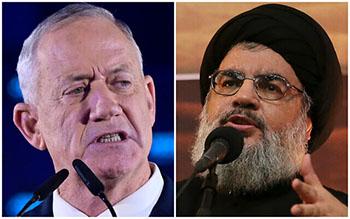Speaking at same event, National Security Adviser Eyal Hulata says US-mediated negotiations are ‘excuse’ for Hezbollah to ramp up threats
Defense Minister Benny Gantz warned on Thursday that Lebanon would suffer dire consequences if the Hezbollah terror group torpedoes US-mediated talks between Israel and its northern neighbor over a maritime dispute.
The dispute, which involves competing claims over offshore gas fields, escalated in June after Israel moved a production vessel near the Karish offshore field, which is partly claimed by Lebanon.
Gantz said ominously that if Hezbollah leader Hassan Nasrallah wants to disrupt the ongoing talks, “he’s welcome to do so, but the price will be Lebanon.”
On Sunday, an Israeli official confirmed some progress in the indirect talks between Lebanon and Israel, but said more work was needed for a final agreement. Meanwhile, Nasrallah has threatened the gas extraction installations, prompting the Israeli military to ramp up defenses and activity in the area.
“All of Israel’s security theaters are active and sensitive. Something could happen tomorrow in any one of them,” Gantz said at a conference at Herzliya’s Reichman University.
On Lebanon, “Israel is ready to reach a deal that will assist both countries economically and energy-wise. I believe there will be two gas rigs in the sea, one on the Israeli side and one on the Lebanese side,” he said.
“We will protect our gas rig regardless,” Gantz added.
When asked if Israel would reexamine the military’s rules of engagement in light of the accidental killing of Al Jazeera reporter Shireen Abu Akleh, Gantz said “there should be an examination of the open-fire policies.”
But he clarified: “This happens all the time and there is nothing new here, because the chief of staff… is the one who sets the open-fire policies.”
The United States had attempted to pressure Israel to reevaluate the rules of engagement after the death of the Palestinian-American journalist.
“Israel’s policy is very simple, we do everything to reduce harm to those uninvolved, and are committed to protecting our troops whenever possible. I think there should be no political interference in the open-fire policies, and where there are exceptions, people will have to give explanations,” Gantz added.
Speaking earlier at the same conference, National Security Adviser Eyal Hulata said the maritime talks were “an excuse” for Nasrallah to ramp up threats.
“Israel wants a stable Lebanon. We want to weaken Hezbollah’s influence in Lebanon. That is why we are trying to advance the negotiations on the maritime border. This is beneficial for security stability and the Lebanese economy,” Hulata said.
“We hope that the Lebanese leadership will also work to reach an agreement and will not allow Hezbollah to increase instability. We are not deterred by Nasrallah’s threats. The Karish rig will start producing as soon as it is ready,” he added.
Hezbollah, which launched four unarmed drones toward the Karish field in July, has threatened further attacks if Israel proceeds with gas extraction in the disputed area.
The London-listed company licensed by Israel to extract gas from the Karish field, Energean, announced last Thursday that it would begin yielding output “within weeks.”
Both countries claim some 860 square kilometers (330 square miles) of the Mediterranean Sea. Lebanon claims that the Karish gas field is in the disputed territory, while Israel says it lies within its internationally recognized economic waters.
Hezbollah remains vociferously opposed to any concessions to Israel.
The Iran-backed terror group and Israel last fought a war in 2006. Beirut and Jerusalem have no diplomatic relations and are separated by the UN-patrolled ceasefire line.
In June, the IDF held a major military exercise in Cyprus, simulating a ground offensive deep inside Lebanon in a potential war against the Iran-backed group.
Hezbollah has long been the IDF’s most significant adversary on Israel’s borders, with an estimated arsenal of nearly 150,000 rockets and missiles that can reach anywhere in Israel.
Times of Israel

